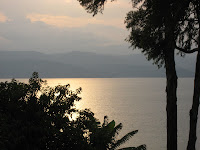
Yesterday I went with David, who runs Rwanda Aid, and Prince, the Rwandan manager, to visit a teacher training college nearby. The government here is notorious for its ambitious and radical new measures. We went there to help with the boldest of them all: teaching every child in English by 2010. Although there are some diplomatic advantages to this (
The school itself is far better equipped than I’d expected. This seems to justify the charity’s decision to work with an existing facility rather than build a new one. There’s a dining hall (see below), a science lab, a theatre, and football pitches. The polyester uniforms and stories of drugs-related expulsions completed the illusion of a British school, although this was soon shattered by a visit to the cowshed. It was interesting, but probably the wrong day to be wearing sandals.
Today really opened my eyes to the difficulties faced by Rwanda Aid, and I’m sure others. The local diocese had produced for us their price for the building and maintenance of 10 new homes complete with livestock and a vegetable garden (soon to be a mandatory addition to all homes). They’d planned for taxis everywhere, the most expensive goats and other pricey extras. All of which would deny help to others in need. There seems to be this no expense spared attitude and, unfortunately, I get the impression that some of this over-budgeting is deliberate.
The final stop of the day was the site of a disabled children’s village they’ve funded (see pic.). It will house up to 50 kids when it’s finished and replaces a very basic facility trying to do the same thing. It will be the best in
The second boy really affected me, he was about 3 or 4 years old with physical and, I suspect, mental problems. He was sitting very quietly on a step by himself. The strong squeeze he gave my finger made me see him, no longer as another sad story of third-world hardship, but a little boy without a family at an age I can remember my brother being. The bombardment of images at home can, I think, all too often desensitize us to the reality. It probably sounds stupid, but I suspect that most people doing what I am have that moment of transition, where the suffering become part of real life rather than an Oxfam appeal.
I’m expecting to harden to things like that while I’m here, but at the moment it’s difficult. Part of me wants to give money to every child that asks for it, but I’m starting to see that that doesn’t do any real good. There is a tendency for children to see white people (mzungu) and stick out there hand in a way that they wouldn’t to rich Rwandans, even though they far more ostentatious with their wealth. One of the main arguments against charity is the creation of a dependency culture and there is, I feel, a real danger of that. What’s struck me is how careful Rwanda Aid is to avoid this, focusing on projects that can be self-reliant. The ultimate aim for them is to no longer be needed. It might sound obvious, but I’m not sure how many groups put that philosophy into practice.
I'm sorry about the photo quality, it takes about 15 minutes to upload each one, even like this.

What else have you found on your father's laptop ? More excellent music ? ! Yours Stephen O
ReplyDeletekeep'em coming Henri.We're living this experience through you. And yes stephen's right, keep uploading anything embarrassing you find on Gavin's laptop...Georges
ReplyDeleteG'Day Henry from everyone in OZ.
ReplyDeleteYour Dad sent the link to this blog, it makes great reading.
What are you eating and where are you sleeping?
Curtis says hi mate.
The girls wanted to know what was wrong with Avril and Beyonce...
See ya mate.
Any chance of you ducking down to South Africa to watch the Aussies smash the South Africans in Cricket?
U Randall